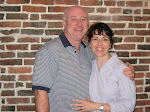The conference last week was amazing. Despite the threat of a nor'easter, the Holiday Inn in Peabody was full. The speakers were amazing. The one thing that all the medical professionals talked about was the holistic (meaning many approaches) treatment of Alzheimer's disease. It was clear that the medications of today can slow the disease from it's path, but they all talked about diet and exercise as being part of the treatment. They all spoke about how leaving an Alzheimer's patient in front of the TV all day just adds to the progression of the disease and loss of skills.
They also talked about how changing an Alzheimer's patient's environment too much (going between children's homes), though might sound like a good idea to you and me, can be confusing and dangerous for the Alzheimer's person because they cannot do "new learning". Keeping things predictable is important. Dr. Paul Raia calls this Habilitation Therapy. This link is to a good article on the subject.
Joanne Koenig-Costa, the author of Learning to Speak Alzheimer's, gave the wrap up address. There wasn't a dry eye in the house when a longterm, care partner/spouse talked about her end-stage Alzheimer's husband and how their relationship now works when he can no longer talk or communicate. She talked about how love still exists. No one could have laid out the heartbreak of Alzheimer's disease to a family better than someone who has walked the path with a loved one and is now facing the end.
The one sad thing about the information is the prediction that there will be 14 million people in the United States with Alzheimer's disease in the year 2050 if we don't have a cure. Living longer is great, but the price we may have to be to do that is very steep. The grief that it may give our families is tremendous, because Alzheimer's does not last just a year....it can progress for up to 20 years.
One of the most beautiful things about our conference is the message that care partners need to take care of themselves first! The speakers kept giving the example of the airplane oxygen masks and how we should put ours on FIRST, then help the other person. Please find a support group if you are a care partner. You can find one through the Alzheimer's Association.
Subscribe to:
Post Comments (Atom)






No comments:
Post a Comment